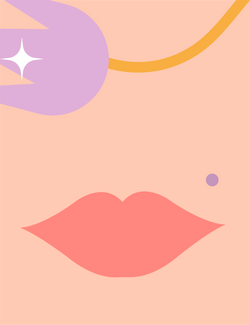Pregnancy is a miraculous journey filled with changes—new responsibilities, sleepless nights, and, yes, swollen breasts that can last for months. While all these transformations come with the excitement of welcoming a new family member, one topic that often gets overlooked is what happens to your hair during this time.
Many new mothers are shocked to discover they’re shedding more hair than usual after giving birth, leading them to wonder if something is seriously wrong. But don’t worry; this phenomenon is completely normal, and we’re here to explain why!
The Phases of Hair Growth
To understand how pregnancy affects hair, let’s dive into the science of the hair growth cycle, which has four main phases:
-
Anagen Phase (Growth)
This is the active growth stage, lasting anywhere from two to six years. During this time, about 85% to 90% of your hair is growing. Your hair follicles are busy pushing out strands that will continue to grow until they’re cut or reach the end of their lifespan.
-
Catagen Phase (Transitional)
Lasting about 10 days, this phase signals the end of active growth. Hair follicles shrink, and hair begins to separate from the bottom of the follicle but stays in place for a little longer. Only about 5% of your hairs are in this phase at any given time.
-
Telogen Phase (Resting)
This phase lasts about three months, during which hair doesn’t grow but also doesn’t typically fall out. About 10% to 15% of your scalp hairs are in this phase at any time.
-
Exogen Phase (Shedding)
This is part of the telogen phase, where hair is shed from the scalp—often aided by washing and brushing. Losing 50 to 100 hairs per day during this phase is normal. It lasts about 2 to 5 months, during which new hairs grow as old ones fall away.
Now that we've gotten a little technical, how does this help us understand the hair loss that can occur during pregnancy?
What Happens to Hair During Pregnancy?
Pregnancy brings dramatic hormonal fluctuations that can affect your hair in different ways. For some women, rising oestrogen levels can prolong the anagen (growth) phase, leading to less shedding and giving hair a fuller, shinier appearance around the 15th week of pregnancy. But this isn't because each strand is thicker; it’s simply that fewer hairs are falling out.
On the flip side, some women may notice their hair becoming more brittle and prone to breakage due to increased progesterone levels. While progesterone is essential for a healthy pregnancy, it can also make hair drier and more fragile, which may lead to breakage—but this isn’t the same as typical hair loss.
Postpartum Hair Loss: Telogen Effluvium
If we enjoy luscious locks during pregnancy, why can’t that last? While hair is less likely to fall out during pregnancy, many women experience significant shedding a few months after giving birth, a condition known as postpartum hair loss or Postpartum Telogen Effluvium (PPTE). This isn’t true hair loss but excessive shedding caused by dropping oestrogen levels after delivery.
Normally, about 90% of your hair is growing while 10% is resting. However, after childbirth, up to 60% of hair may enter the telogen phase, leading to noticeable shedding. This typically peaks around three to four months postpartum, as the normal hair loss that was delayed during pregnancy can all come out at once. It can be alarming, but remember that postpartum hair loss is temporary. This excessive shedding usually lasts between six to twelve months, with hair growth returning to normal as hormone levels stabilise.
Is It Normal to Lose Hair During Early Pregnancy?
While hair loss in early pregnancy is uncommon, it can happen. This is typically due to telogen effluvium—a condition triggered by stress or shock rather than the pregnancy itself. If you experience hair loss during this time, it’s wise to consult your healthcare provider to rule out any other factors.
Vitamins for Pregnancy Hair Health
To keep your hair healthy during pregnancy, consider incorporating essential vitamins like biotin, vitamin E, vitamin A, and vitamin D. However, always consult with your healthcare provider before starting any supplements.
Can You Prevent Pregnancy Hair Loss?
There’s usually no need to worry about preventing hair loss during pregnancy, as it’s unlikely to occur. Postpartum hair loss, while surprising, is normal and typically resolves on its own. Most women see their hair return to its pre-pregnancy fullness by their child’s first birthday or even sooner.
After Pregnancy: Will the Hair Grow Back?
Absolutely! Postpartum hair loss may be alarming, but it’s not permanent. The hair lost during this period will grow back, and many women report that their hair appears thicker and healthier afterward. You might even notice improvements in body, shine, and texture after the shedding resolves.
Conclusion: Hair Loss Due to Pregnancy is Temporary
In summary, while pregnancy and postpartum can bring about significant changes in hair growth and shedding, these changes are typically temporary. If you experience hair loss or excessive shedding, it’s always a good idea to consult your midwife or healthcare provider to rule out any underlying conditions. However, for most women, hair will return to its normal state within a year after childbirth.

